

Fukushima... Radiation references. "Prescription for Survival": A Debate on the Future of Nuclear Energy Between Anti-Coal Advocate George Monbiot and Anti-Nuclear Activist Dr. Helen Caldicott. This is a rush transcript.
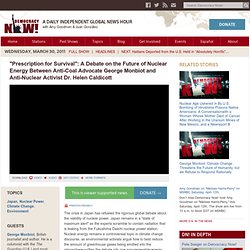
Copy may not be in its final form. AMY GOODMAN: Japan’s Prime Minister Naoto Kan said Tuesday his government is in a "state of maximum alert" over the nuclear crisis at the Fukushima Daiichi nuclear power plant. High radiation levels continue to delay efforts to fix the plant’s cooling systems, and experts are now debating whether to cover its reactor buildings with a special material in order to try and stop the spread of radioactive substances.
"Underestimating the Seriousness of the Problem": Experts Urge Japan to Raise Nuclear Alert Level and Evacuate Wider Area. This is a rush transcript.
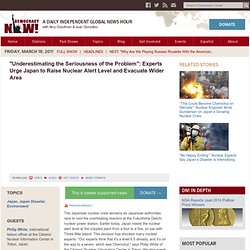
Copy may not be in its final form. "Why Are We Playing Russian Roulette With the American People?": Longtime Nuclear Critic Ralph Nader Advocates Phasing Out Nuclear Power Industry. This is a rush transcript.

Copy may not be in its final form. JUAN GONZALEZ: We’re discussing the continuing nuclear crisis in Japan, and we’re joined by Philip White from the Citizens’ Nuclear Information Center in Tokyo, Dr. Ira Helfand from Physicians for Social Responsibility, and Ralph Nader joins us from Washington, longtime consumer advocate, corporate critic and former presidential candidate. His latest book is Only the Super-Rich Can Save Us! Welcome to Democracy Now! RALPH NADER: Thank you, Juan. “Serious Danger of a Full Core Meltdown”: Update on Japan’s Nuclear Catastrophe. This is a rush transcript.
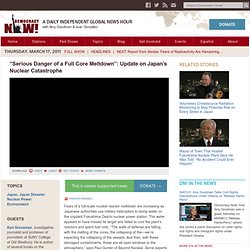
Copy may not be in its final form. JUAN GONZALEZ: Japanese authorities have begun using military helicopters and water cannon to dump water on the crippled Fukushima Daiichi nuclear power station in an attempt to help cool the plant’s reactors and spent fuel rods. But fears of a full-scale nuclear meltdown are increasing as the initial attempts appear to have failed. Fukushima and the Ocean.
FAQ: Radiation from Fukushima. Radiation Survival. Radiation Survival. ☢Radiation☢ Brand new info on Fukushima. Dr. Helen Caldicott Talks Bluntly About Fukushima. US Gov’t Headline: Alaska island “appears to show impacts from Fukushima” — “Significant cesium isotope signature” detected — Scientists anticipate more marine life to be impacted as ocean plume arrives. Prominent Japanese Environmentalist Keibo Oiwa Urges Global Movement to End Nuclear Power and Confront the “Crazy System Based on Greed, Anger and Ignorance”
We speak with leading Japanese cultural anthropologist and environmentalist Keibo Oiwa in Yokohama.
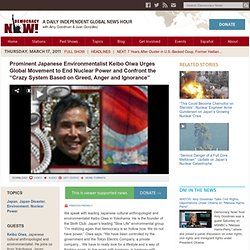
He is the founder of the Sloth Club, Japan’s leading "Slow Life" environmental group. “I’m realizing again that democracy is so hollow now. We do not have power,” Oiwa says. “We have been controlled by the government and the Tokyo Electric Company, a private company... We have to really look for a lifestyle and a way of thinking again, to live again with harmony, in harmony with nature.”
This is a rush transcript. JUAN GONZALEZ: Last night, Democracy Now! KEIBO OIWA: My name is Keibo Oiwa. And what I want to say at this point to the people outside of Japan is that they should try to stop all the nuclear power, you know, eliminate or stop right now. And I’m really realizing again that, you know, democracy is so hollow now. JUAN GONZALEZ: That was Keibo Oiwa. Show Full Transcript › ‹ Hide Full Transcript.
Radiation from Japan nuclear plant arrives on Alaska coast - North. Scientists at the University of Alaska are concerned about radiation leaking from Japan's damaged Fukushima nuclear plant, and the lack of a monitoring plan. Some radiation has arrived in northern Alaska and along the west coast. That's raised concern over contamination of fish and wildlife. More may be heading toward coastal communities like Haines and Skagway. Douglas Dasher, a researcher at the University of Alaska Fairbanks, says radiation levels in Alaskan waters could reach Cold War levels. Head researcher “is sounding the alarm” over striking changes in killer whales off Canada and Alaska since 2011 — “Unusually high mortality rate” and “odd behavior” — “Experts fear something’s wrong with the environment”
Chernobyl: country by country S-Z. Fukushima Trial Run Begins Dangerous Reactor 4 Clean-Up. Spent fuel pool in the unit 4 reactor building on October 15, 2013.
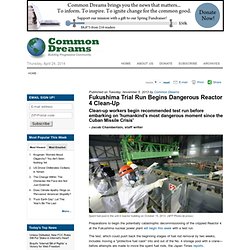
(AFP Photo/Jiji press)Preparations to begin the potentially catastrophic decommissioning of the crippled Reactor 4 at the Fukushima nuclear power plant will begin this week with a test run. The test, which could push back the beginning stages of fuel rod removal by two weeks, includes moving a "protective fuel cask" into and out of the No. 4 storage pool with a crane—before attempts are made to move the spent fuel rods, the Japan Times reports. Daily News. HTEM. High torque Electric motor Using some of the same techniques as used in the 10kw generator we are now getting ready to produce a new 100kw peak three phase electric vehicle motor The methods will be to take two 50kw Prius stators and rotors and using custom machined and fabricated aluminum housings and splined couplers machined from the stock Prius parts they will be coupled together in one housing Using the standard Prius high voltage inverters coupled together as a unit of two having a common throttle input we are experimenting to see if we can in fact supply electric vehicle drive motors equal to those now costing $23-28 thousand dollars.

“No Happy Ending”: Nuclear Experts Say Japan’s Disaster is Intensifying. This is a rush transcript.
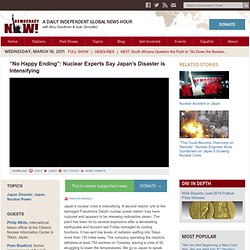
Copy may not be in its final form. JUAN GONZALEZ: Japan’s nuclear crisis is intensifying. A second reactor unit at the damaged Fukushima plant may have ruptured and appears to be releasing radioactive steam. According to the New York Times, it is not clear how serious the breach may be, but the vessel that possibly ruptured is the last fully intact line of defense against large-scale releases of radioactive material. The plant has been hit by several explosions after a devastating earthquake and tsunami last Friday damaged its cooling functions. The radiation levels around the plant are so high that Japanese authorities abandoned a plan on Wednesday to dump water from military helicopters in an attempt to cool the reactors.
"Underestimating the Seriousness of the Problem": Experts Urge Japan to Raise Nuclear Alert Level and Evacuate Wider Area. Prominent Japanese Environmentalist Keibo Oiwa Urges Global Movement to End Nuclear Power and Confront the “Crazy System Based on Greed, Anger and Ignorance” Fukushima disaster: Long road to nuclear clean-up. 11 March 2013Last updated at 02:03 ET By Rupert Wingfield-Hayes BBC News, Fukushima nuclear plant Rupert Wingfield-Hayes on the massive logistical operation of getting into contaminated Fukushima.
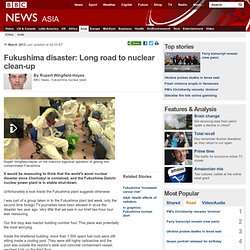
Decommissioning takes 90 years and costs £954m. Posted by Mochizuki on February 29th, 2012 · 7 Comments [Quote of Dailymail.co.uk] World’s oldest nuclear power station closes… but it will take 90 more years and £954m to clear it completely The world’s oldest running nuclear power station was shut down today after 44 years in use – but will take another 90 years to clean up.
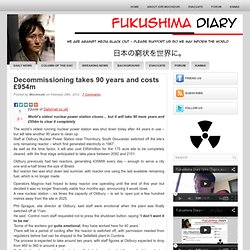
Staff at Oldbury Nuclear Power Station near Thornbury, South Gloucester switched off the site’s only remaining reactor – which first generated electricity in 1967. Why Fukushima Is A Greater Disaster Than Chernobyl By Robert Alvarez. Why Fukushima Is A Greater Disaster Than Chernobyl By Robert Alvarez 24 April, 2012Institute for Policy Studies The radioactive inventory of all the irradiated nuclear fuel stored in spent fuel pools at Fukushima is far greater and even more problematic than the molten cores. In the aftermath of the world’s worst nuclear power disaster, the news media is just beginning to grasp that the dangers to Japan and the rest of the world posed by the Fukushima-Dai-Ichi site are far from over. After repeated warnings by former senior Japanese officials, nuclear experts, and now a U.S. After visiting the site recently, Senator Ron Wyden (D-OR) wrote to Japan's ambassador to the U.S. stating that, "loss of containment in any of these pools could result in an even greater release than the initial accident.
" Lone Holdout's First Nuclear Winter Looms in Tohoku. MIHARU VILLAGE, Fukushima Prefecture — As bitter winds blow around cesium and other radioactive particles spewed from the nearby Fukushima No. 1 nuclear power plant's reactors, Naoto Matsumura lights a cigarette, which he considers relatively good for his health. In the zone: Naoto Matsumura, who believes he is the only person still living in the evacuation zone around the Fukushima No.1 nuclear power plant. (Christopher Johnson Photo) "I would get sick if I stopped smoking; I have a lot to worry about," says Matsumura, 52, who reckons he is the only person still living within a 20-km radius of the world's worst atomic disaster since Chernobyl.